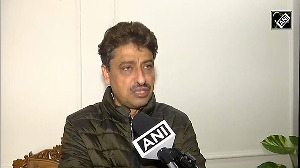Indian Cricket League (ICL), a brainchild of Subhash Chandra-owned Essel Group, is no match to the World Series Cricket (WSC) of the late Kerry Packer in any way.
While the ICL has created only a minor problem for the Board of Control for Cricket in India (BCCI), or so it seems at the moment, WSC turned the cricket world upside down in the late 1970s. So much so, the schism between the Australian media mogul and the authorities threatened to pull cricket apart at one stage.
Always hell-bent on resisting progressive measures even when they are good for the game in the longer run, conservatives and traditionalists condemned the Australian media mogul in no uncertain terms. They ridiculed the WSC as a "circus" and the cricket that was played under the Packer umbrella as "pyjama cricket".
With the benefit of hindsight, however, it was proved that the Aussie had done a great service to the game and its underpaid and taken-for-granted practitioners the world over.
While the long retired Kapil Dev is Subhash Chandra's recruiting officer, Packer's man Friday was Tony Greig, who was not only England's captain but also the world's leading allrounder at that time.
It is no coincidence that Greig is now on the ICL's executive board. Greig executed his duties to a nicety and got the crème de la crème of the game to play in the WSC, cutting a broad swathe through the heart of the cricket establishment.
South Africa's inhumane practice of apartheid had splashed across into the sporting world and many talented Proteas were deprived of Test cricket because of the international ban. The closest they could get to the highest level of the game was county cricket in England and the Sheffield Shield in Australia.
 Packer was like a godsend for them to rub shoulders with their international cousins and it was no surprise that enormously gifted players like Mike Procter, Graeme Pollock, Eddie Barlow, Barry Richards, Clive Rice, Garth Le Roux, Kepler Wessels and others were the early birds to join the WSC.
Packer was like a godsend for them to rub shoulders with their international cousins and it was no surprise that enormously gifted players like Mike Procter, Graeme Pollock, Eddie Barlow, Barry Richards, Clive Rice, Garth Le Roux, Kepler Wessels and others were the early birds to join the WSC.
But Australia, England, Pakistan and West Indies were also badly hit as many of their formidable players were attracted by the Packer package.
Greg Chappell, Ian Chappell, Doug Walters, David Hookes, Rod Marsh, Dennis Lillee, Jeff Thomson, Gary Gilmour, Max Walker, Tony Greig, John Snow, Dennis Amiss, Allan Knott, Derek Underwood, Imran Khan, Majid Khan, Zaheer Abbas, Asif Iqbal, Javed Miandad, Clive Lloyd, Viv Richards, Lawrence Rowe, Roy Fredericks, Gordon Greenidge, Desmond Haynes, Collis King Derryck Murray, Michael Holding, Andy Roberts, Joel Garner, Colin Croft, Wayne Daniel and a host of other stars from these countries descended on the WSC.
Even Sunil Gavaskar, Gundappa Viswanath and Syed Kirmani were rumoured to have been approached by Packer's agents, but these Indians told them where their loyalties lay.
 All that the ICL has managed to recruit so far are a bunch of Ranji Trophy players who are either woefully out of form or past their prime. A few youngsters like Ambati Rayudu who have failed to live up to their earlier promise and are now eternal strugglers and a handful of mediocrities like Laxmi Ratan Shukla and Deep Dasgupta, who were lucky enough to play for India on a few occasions, have been signed.
All that the ICL has managed to recruit so far are a bunch of Ranji Trophy players who are either woefully out of form or past their prime. A few youngsters like Ambati Rayudu who have failed to live up to their earlier promise and are now eternal strugglers and a handful of mediocrities like Laxmi Ratan Shukla and Deep Dasgupta, who were lucky enough to play for India on a few occasions, have been signed.
Even those few foreigners signed by the ICL have either retired or are on the verge of calling it a day with the sole exception of Mohammad Yousuf. He is at the peak of his prowess and undoubtedly the ICL's biggest catch, all things and players, including Brian Lara, considered.
There will be only Twenty20 matches at the ICL, at least for a start. But there were superbly-contested 'Supertests' between the Australian giants and their West Indian counterparts at the WSC.
There were also exciting matches between Australia and World XI, and also between the West Indies and World XI, in coloured clothing, on drop-in pitches and under floodlights. To add to these novelties was the use of helmets by many players. All these varieties have stuck and become regular features of cricket in the world today.
The cricket, too, was of a very high class in the WSC and played with the utmost seriousness by every player regardless of his status. Greg Chappell was at his vintage best almost each time he played against the star-studded West Indies, boasting the most feared pace attack in the history of cricket.
He scored really heavily and hit centuries almost at will, reminding many of his terrific form with the willow while leading his country against the same opponent in the 1975-76 series in Australia.
Viv Richards and Rowe were not far behind the former India coach. Playing a string of scintillating, stirring innings against the devastating Lillee, Thomson and others of their ilk, Rowe, who scored a double century and a century on his actual Test debut in the early 1970s, pricked the myth that he was vulnerable against hostile fast bowling on the greentops and fliers and silenced his detractors in style.
Test cricket's lost gem, Barry Richards, also enhanced his reputation as a master, explosive batsman. As far as bowlers were concerned, despite the rampaging West Indian fast bowlers, who kept sharing wickets among themselves as usual, Lillee virtually had no equal. He bowled more than 3,000 deliveries in14 matches and took 67 wickets at 26.87.
The ICL can never match the WSC in terms of the quality of cricket as well as romance and thrill. Nor the cricketers who produced it day and night, literally, so long as the WSC lasted. Of course, this is apparently not the goal of the ICL bosses.
However, there are some striking similarities between the ICL and the WSC. Like Packer, who owned Channel 9 down under, Subhash Chandra is the owner of the very popular Zee television channel and its other branches.
Packer thought of launching the WSC after he had problems with the then Australian Cricket Board over telecast rights of the matches. Ditto the Zee supremo. Just like Packer, it had become sort of an ego clash as well as a prestige issue for Subhash Chandra after the kind of treatment his company had been given by the BCCI despite being the highest bidder for the exclusive rights for telecast of matches involving Team India.
Last but not least, the Indian tycoon is also armed with a blank cheque book and open arms for those who wish to join his breakaway league.
But these similarities end here. Packer and his WSC did a lot for cricket and players. He eventually managed to convince the game's adamant, traditional administrators of the price value of cricketers who strive for excellence, toil on the field and fill the coffers of their respective boards. He completely modernised the game and metamorphosed it into a big business, nay an industry. Cricketers owe a sense of gratitude to Packer for the lap of luxury they find themselves in today.
There is already a lot of money in cricket now, even at first-class level, so what the ICL can or will do for the game and its practitioners is in the realm of conjecture at the moment.
Photographs: AFP/Getty Images






